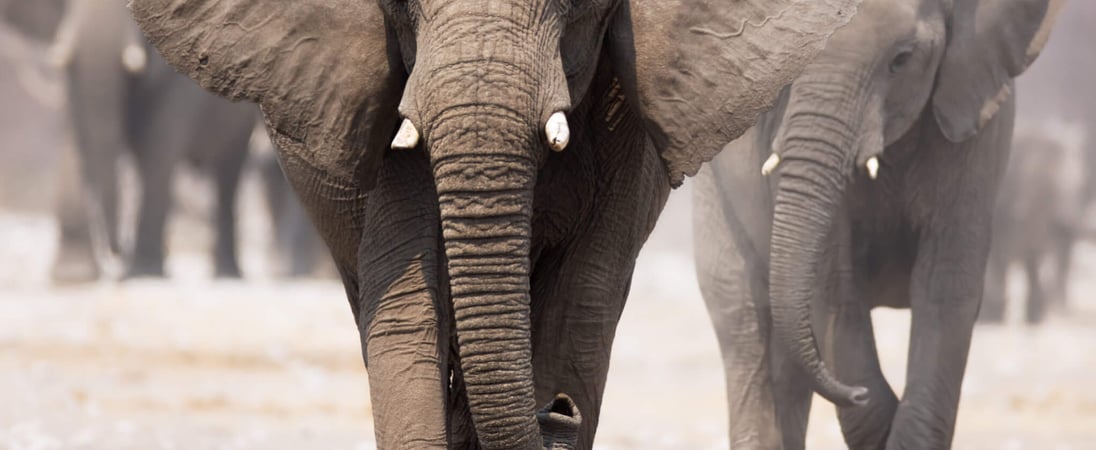
World Elephant Day
Magnificent creatures with incredible memories and emotional intelligence that astound researchers and animal lovers alike.
They’re intelligent. They’re family-oriented. They have great memories. They are capable of feeling a wide range of deep emotions, from intense grief to joy bordering on elation, as well as empathy and stunning self-awareness. They create complex, supportive societies much like our own.
Taking into consideration all of that and much, much more, what’s not to love about elephants? Still, countless elephants are brutally killed every year for their ivory by greedy poachers who then leave their carcasses to rot in the sun. As Graydon Carter, Editor of Vanity Fair put it:
We admire elephants in part because they demonstrate what we consider the finest human traits, but the way we treat them puts on display the very worst of human behavior.
World Elephant Day is the perfect time to find out more about these amazing animals and what we can do to preserve and protect them so they do not go the way of the mammoth.
History of World Elephant Day
World Elephant Day was created in 2011 by two Canadian filmmaker Patricia Sims and Thailand’s Elephant Reintroduction Foundation and first celebrated on August 12, 2012. The initiative was greatly supported by film star and Star Trek legend William Shatner who narrated the documentary Return to the Forest, a fascinating 30-minute film about the reintroduction of captive Asian elephants to the wild.
The motivation for the first World Elephant Day was to draw attention to the plight of these majestic creatures to populations and cultures all over the world. Due to their pleasant and intelligent nature, the world’s largest land animals are loved worldwide. But, unfortunately, these magnificent creatures face multiple threats to their survival.
One major issue is the ivory trade. Currently, the demand for ivory is the biggest in China, with the price of ivory often exceeding the price of gold, something that makes elephants bigger targets than ever. The economics here work firmly against the humble elephant. Extreme levels of poverty in Africa mean that people can often make a month’s wages or more from the ivory of a single animal, selling it on the international market.
Furthermore, the parts of the world that demand ivory, such as China, are becoming increasingly wealthy, meaning that they can pay more for tusks. These dual factors are combining to make elephant poaching one of the most lucrative activities on the plant.
Habitation loss is also a danger to the world’s elephant population as it deprives elephants of the hundreds of pounds of food they need every day, making it more difficult for them to breed and making it easier for poachers to track them down. Unfortunately, researchers believe that loss of habitat is the primary driver for the loss of elephants in the wild. A century ago, they numbered more than 12 million in the wild. Today, that figure may be as low as 400,000, with as many as 20,000 per year killed by poachers.
Data suggest that the geographic range of elephants fell by around 30 percent between 2002 and 2011, with a similar loss of savannah for them to roam. The introduction of large parks throughout Africa has allowed habitat destruction to stabilize, but illegal poaching remains a dire threat. Circuses and tourism are also serious problems for the animals’ well-being.
World Elephant Day is an opportunity for everyone to get together to find ways to reduce conflict between humans and elephants. The solution probably lies in a combination of strategies. These could include land development that minimizes habitat destruction, electric fences to keep elephants away from farms, and changes in local attitudes.
Luckily, an increasing number of both celebrities and politicians have become interested in the cause, including Leonardo DiCaprio, Ashley Judd, and President Barack Obama.
World Elephant Day Timeline
50 million BC
Elephants roam Africa
The elephant species is believed to have originated in Africa and then eventually spread across land bridges to Asia and Europe.[1]
2012
World Elephant Day is founded
Canadian Patricia Sims and the Elephant Reintroduction Foundation of Thailand, which is a royal initiative in Thailand. The day continues to be led by Patricia Sims.[2]
19th-20th Centuries
Elephant populations are reduced
The number of elephants decreases, even with international efforts to protect them.[3]
1976
African Elephants are placed on the Endangered Species list
The growing popularity of ivory leads to a severe decrease in populations and elephants are considered endangered as poachers continue to kill them for their tusks.[4]
2015
World Elephant Society is started
Founded as a charitable organization, World Elephant Society was created to help support the World Elephant Day campaign.[5]
How to Celebrate World Elephant Day
The best way to celebrate this day is to take the opportunity to educate yourself about these magnificent mammals and share your knowledge with others. As ever, simply spreading the word about the dangers these magnificent mammals face via social media can actually make a real change.
Thanks to your sharing a few of World Elephant Day’s Facebook posts, that old high school acquaintance of yours who is traveling to Thailand on her honeymoon this year may just decide to skip the elephant ride when she realizes that “training” elephants often involves tying and beating them daily for months on end.
Watching the aforementioned documentary will only take half an hour of your time but is sure to be a real eye-opener, not to mention the absolutely stunning landscapes shown in it. If you want to get a bit more involved, you could choose to make a donation to a foundation dedicated to protecting elephants from poachers or relocating them to locations better suited to their needs.
The organizers of World Elephant Day also provide plenty of ideas they encourage for helping these incredible creatures in the wild.
The first thing you can do is sign the World Elephant Day pledge. This document allows you to join with countless other people around the world to put pressure on governments to change their policies.
Organizers also want people to promote ethical elephant hashtags on their social media accounts, raising awareness of the abuse of animals worldwide, including in the tourism industry.
Clearly, buying any products containing ivory is a big no-no and should be avoided wherever possible. When buying pianos, antiques, or other products, always check to ensure that the manufacturer has not used elephant tusks in the production process.
You can also support organizations working hard to protect natural elephant habitats. Many of these areas are under threat right now because of population pressures in sub-Saharan African countries as well as India, where cities are sprawling and booming.
Finally, you can invest in projects that seek to provide sustainable and lucrative livelihoods to people who live alongside elephants. These programs improve economic circumstances so that locals don’t feel that they need to poach to make ends meet.
Whichever way suits you best, make sure that you spend this day in a way that helps elephants the world over so we, in turn, can continue to marvel at them and their uniquely fascinating way of life. By playing your part, you can make a big difference.
World Elephant Day FAQs
When is World Elephant Day?
World Elephant Day takes place on August 12 of each year. Other celebration days for elephants include Save the Elephant Day on April 16 and National Elephant Appreciation Day on September 22.[1]
How is World Elephant Day celebrated?
One of the best ways to celebrate World Elephant Day is to help elephants by raising awareness, learning more about elephants, or signing the World Elephant Day Pledge.[2]
Are elephants endangered?
The elephant species is classified as endangered, with only 40,000-50,000 left in the wild.[3]
Why is World Elephant Day celebrated?
World Elephant Day is observed to bring attention to the plight of Asian and African elephants, conserving and protecting them from the numerous threats they face.[4]
How much does an elephant weigh?
As the largest land animals on earth, a large male elephant can weigh up to 15,000 pounds.[5]
Also on ...
View all holidaysNational Vinyl Record Day
CDs and cassettes are fading into the past, but vinyl is more popular than ever. Support your local record shop, or dig out your favorite vinyl album.
Baseball Fans Day
Amidst crackling excitement, camaraderie echoes, cheering for the crack of the bat and triumphant victories.
National Middle Child Day
Living in the shadow of your older siblings, competing for attention with your younger…Middle Child Day is a well-deserved day all about those middle kids.




